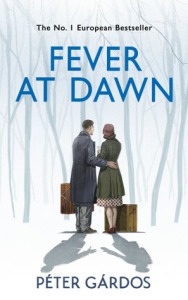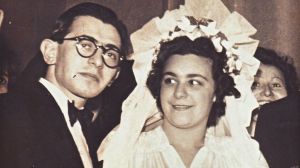 An utterly charming novel based on a true story of the courtship of the authors parents, young Hungarian survivors of the Nazi concentration camps, post World War Two.
An utterly charming novel based on a true story of the courtship of the authors parents, young Hungarian survivors of the Nazi concentration camps, post World War Two.
Shortly after his father Miklós’s death, Péter Gárdos’s mother handed him a bundle of letters, written in the months after the Holocaust. He read them immediately, every one of them, stunned to discover the romantic story behind his parents meeting, a period they had never talked about or shared and one that might have been lost forever, had his mother not decided to share them.
The novel takes place during the six months that Miklós and Lili were letter correspondents, Miklós who’d survived the camps was diagnosed with incurable TB and told he had only six months to live. He and others were in recovery in Sweden, where they would stay until the had the strength and health to return to whatever remnants of their lives awaited them in Hungary.
Declaring war on death, he wrote 117 letters to young Hungarian women convalescing in other hospitals in Sweden, where many of the Hungarian survivors were being taken care of after the horrors of their wartime experience.
Lili Reich was one of the 117 women who received a letter. She was an eighteen-year-old patient at the Smålandsstenar rehabilitation hospital. It was early September. She opened the envelope and scanned its contents. The young man from distant Lärbro did have lovely handwriting. But he must have mixed her up with someone else. She promptly forgot about the whole thing.
He settled on Lili as “the one”, though she was less certain that she was what he was looking for, but agreed to write to him. Over the next six months they get to know each other through their correspondence and develop a tentative affection for each other.
 Gárdos has written a heart-warming, unsentimental account of their relationship and of the characters that surrounded the two young people during this time, their compatriots, the doctors and nurses and the Rabbi who received letters from a concerned friend of Lili, intent on stopping the liaison and her intention to convert to Catholicism.
Gárdos has written a heart-warming, unsentimental account of their relationship and of the characters that surrounded the two young people during this time, their compatriots, the doctors and nurses and the Rabbi who received letters from a concerned friend of Lili, intent on stopping the liaison and her intention to convert to Catholicism.
It has both touching and tragic moments as all these young people wait for news of their families and loved ones, moments the author resists exploiting which could have made this a much more emotionally charged novel and will no doubt make it a heart-rending film, rather he focuses as much on the lighter, more positive moments, the desire to overcome the death sentence, to survive and the importance that the promise of love and the support and solidarity of others contributes to it.
Highly recommended.
Here is a clip of that author talking about that moment of being given the letters and what it meant for him to read them.
Note: This book was and ARC (Advance Reader Copy) kindly provided by the publisher.

Definitely to be added to the ‘must read’ list. Thank you.
LikeLiked by 1 person
It’s a great story Margaret and wonderful that it was allowed to come to light so many years after it all happened.
LikeLiked by 1 person
Oh, this looks like a lovely story! I just added it to my “to read” list. So, a year or so ago, I signed up for this email “clean up” thing and it took your emails which is why I haven’t commented here!! I unenrolled last week and happily your emails came back. I missed them and didn’t even realize how much I did. You write such great reviews, Clare. Thank you.
LikeLiked by 1 person
Oh, so lovely to hear from you Amy, you were one of my very first followers and I remember following your blog while you were writing your novel, have you published it? I’d love to read it when you do! It sounded like a wonderful premise for a historical novel as I recall. Thanks for coming back and letting me know!
LikeLike
I found this touching myself so much more.as it.was a true story somewhat
LikeLiked by 1 person
Yes, wasn’t it wonderful Stu, I loved listening to the author talking about the discovery, sad that he was never able to have a conversation with his father about that period in his life, but so great that his mother gifted him the letters and that he has brought them to life. I’d love to see his film.
LikeLiked by 1 person
What a wonderful story.
LikeLiked by 1 person
It’s truly delightful Ali, I hope you get a chance to read it, I’m surprised I haven’t seen more reviews, there was quite a bidding war when the English translation rights were sold, between nine publishers but I haven’t seen it talked about too much since publication.
LikeLiked by 1 person
I’ve had my eye on this one, and think it must be even more wonderful to read knowing that it’s a true story!
Makes me wonder about all those stories that we *don’t* know about…
LikeLike
Exactly what I thought after reading this and listening to the author Naomi. He asked his mother why they had never talked about the letters and he wondered why his father as a writer and journalist had never used them as material. They wanted to make a fresh start I guess and forget the past, which although he presents this as a wonderful and romantic story, foreshadows one of the greatest horrors of humanity that they were fortunate to survive, but would always have to live with the memory of. Many others will have found happiness too but perhaps also resist dragging up memories of the past that are now at rest and less disturbing than when freshly remembered.
LikeLike
This sounds like a very touching story, Claire. Just the sort of thing we need in these dark times. I’ve seen a few reviews of this novel now, all positive. Beautifully captured as ever.
LikeLike
Am in middle of reading Brief Stop on Road From Auschwitz – really powerful and emotional read. Will add this to the list for ‘what next’
LikeLike
How wonderful that this novel is based on the truth in his life! I love stories that are true, and even go so far as to feel that many fiction books have at their core what I see as truth, but it’s especially fine to have an account based on the people in his life.
LikeLike
Lovely review! I share your sentiments about the author not exploiting the sad moments, which is usually the case with novels set in this era. I think it’s kind of reflective of the time in that sense; after everything that had happened, people just wanted to forget and move on with their lives (unlike now when we try our hardest to keep the memory of these events alive). I like that this novel focused on the light at the end of the tunnel, so to speak, rather than the tunnel itself.
LikeLiked by 1 person
This goes on my list right away. Thanks for the lovely post.
LikeLiked by 1 person
It’s a wonderful story Emma, happy to hear you’ll be looking out for it!
LikeLike